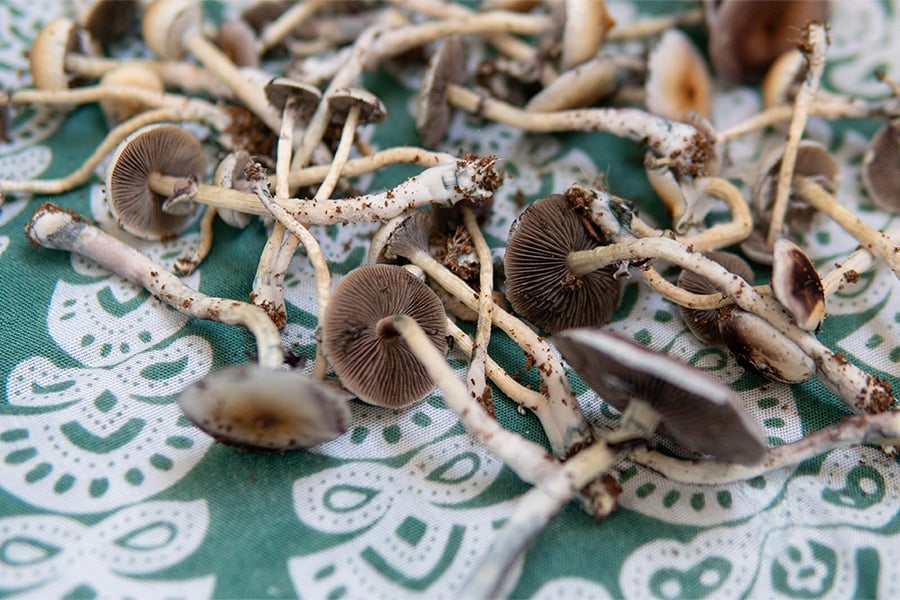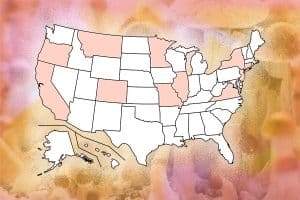Colorado made history in November when voters legalized guided magic mushroom journeys, mostly decriminalized psychedelics, and opened the door to wider regulation. Colorado is now the second state, after Oregon, to allow all adults, regardless of whether they have a diagnosis, to access supported psychedelic experiences. Questions remain over the composition of an advisory board that will craft the rules for the new treatment ecosystem, while efforts to rebuild trust among a somewhat divided community of pro-reform activists continue.
“It was kind of a psychedelic experience for all of us,” says Jaz Cadoch, co-founder of psychedelics ethics consultancy Alkemi and member of the steering committee for the measure, known as the Natural Medicine Health Act. “I have seen it as a beautiful and triumphant, yet difficult, opportunity to grow. Coming out on the other end of it, we’re all stronger and more determined; and understand more what it is exactly that we need to be doing.”
The measure passed narrowly in the state, 53.6 percent to 46.4 percent. Some campaigners publicly opposed the measure due to a lack of initial community engagement which led to fears of corporate influence in a regulated market and decriminalization and equity clauses that left room for interpretation by authorities.
“There’s still a lot of people who are hurting,” adds Cadoch. “The indigenous folks of the community here still are feeling a lack of trust. Rebuilding and repairing that trust between everybody who split off in different directions is really the main focus right now.”
READ: Why Everyone Cares So Much About Colorado’s Psilocybin Bill
Her consultancy is helming a community needs assessment survey to help address how best to roll out the NMHA, with psilocybin “healing centers” to open by late 2024. “We have little adequate, quantifiable data around the grassroots psychedelic communities’ desires and needs regarding how this initiative ought to be implemented,” it says.
Veronica Lightening Horse Perez, a psychedelic therapist in Denver, is calling on decision makers to ensure indigenous people, and traditions, are not overlooked.
“It’s very easy to get lost in a rulemaking process and forget, as has been done throughout history, about indigenous people in their contribution,” Perez, who is Native American, tells NPR for Colorado. “We can create a model in which it is recognized, in which we are asking for indigenous reciprocity, remembering that there is a sacred and cultural use and that this population did keep it sacred.”
How to Grow Shrooms Bundle
Take Both of Our Courses and Save $90!
Colorado governor Jared Polis issued a proclamation following the vote late last month which said the state would move forward with implementing the measures, including “allowing limited personal possession, use, and uncompensated sharing of natural medicine; providing specified protections under state law, including criminal and civil immunity, for authorized providers and users of natural medicine; and, in limited circumstances, allowing the retroactive removal and reduction of criminal penalties related to the possession, use, and sale of natural medicine.”
READ: Where is Psychedelic-assisted Therapy Legal?
David Bronner, CEO of Dr. Bronner’s Magic Soaps, which backed the ballot initiative, recognizes that it was “an intense process that not everyone was psyched about” but, overall, says this is a significant step forward.
“We can grow, share, and aggregate personal possession amounts of natural medicine in one place or person, facilitators and healers are protected and we can proceed to set up above ground community healing circles, grow co-ops and churches,” he writes, in addition to a regulated psilocybin model which must be established by the end of 2024, in his most recent blog. He notes that Sacred Plant Alliance, a consortium of entheogenic churches incubated by the Chacruna Institute but which is now independent, will also administer a seed fund supported by Dr. Bronner’s.
From June of 2026, if recommended by the Natural Medicine Advisory Board, the Colorado Department of Regulatory Agencies may also legalize supported sessions with DMT, ibogaine, and mescaline (not derived from peyote), according to the language of the bill. The advisory board is not explicitly bound by the language of the bill to do this.
“There’s a lot of uncertainty about how the future is going to unfold with the implementation,” says Ramzy Abueita, co-founder of Decriminalize Nature Boulder. “A lot of the rules for regulation are going to be under the whims of an unelected advisory board that is going to be appointed by the governor.”
Fortunately, he adds, the measure spells out a set of conditions for the types of people required to be appointed before January 31, such as experts on mycology, traditional indigenous uses of natural medicine, and other religious uses. “We’re putting out a call for members of our community to apply using the forum on the state’s website,” he says. “What we don’t want to see are highly restrictive and regimented regulations that would sterilize the experiences and make it difficult for entities that don’t have a lot of capital to operate.”
That said, Abueita remains optimistic and recognizes that the vast majority of his DN branch’s objectives have been achieved. “We were able to get some pretty great and progressive policies through: this was a product of community feedback during the whole process.”
Taylor West, from New Approach PAC, which masterminded the ballot vote and its passing, says the advisory board will take questions around equity and accessibility “incredibly seriously” and that Oregon’s experience shows it is not straightforward.
“Group therapy, for instance, will be [considered] as a way of making it more accessible and less cost prohibitive for folks,” she says. People with mental health conditions may also be signposted to more expensive treatment options with greater levels of care, while others would be able to access cheaper options.
“The experience in Oregon makes it clear that this is a challenging process,” she adds. “I would anticipate that it will take the full amount of time here in Colorado [to implement] as well.”

DoubleBlind is a trusted resource for news, evidence-based education, and reporting on psychedelics. We work with leading medical professionals, scientific researchers, journalists, mycologists, indigenous stewards, and cultural pioneers. Read about our editorial policy and fact-checking process here.

DoubleBlind Magazine does not encourage or condone any illegal activities, including but not limited to the use of illegal substances. We do not provide mental health, clinical, or medical services. We are not a substitute for medical, psychological, or psychiatric diagnosis, treatment, or advice. If you are in a crisis or if you or any other person may be in danger or experiencing a mental health emergency, immediately call 911 or your local emergency resources. If you are considering suicide, please call 988 to connect with the National Suicide Prevention Lifeline.



